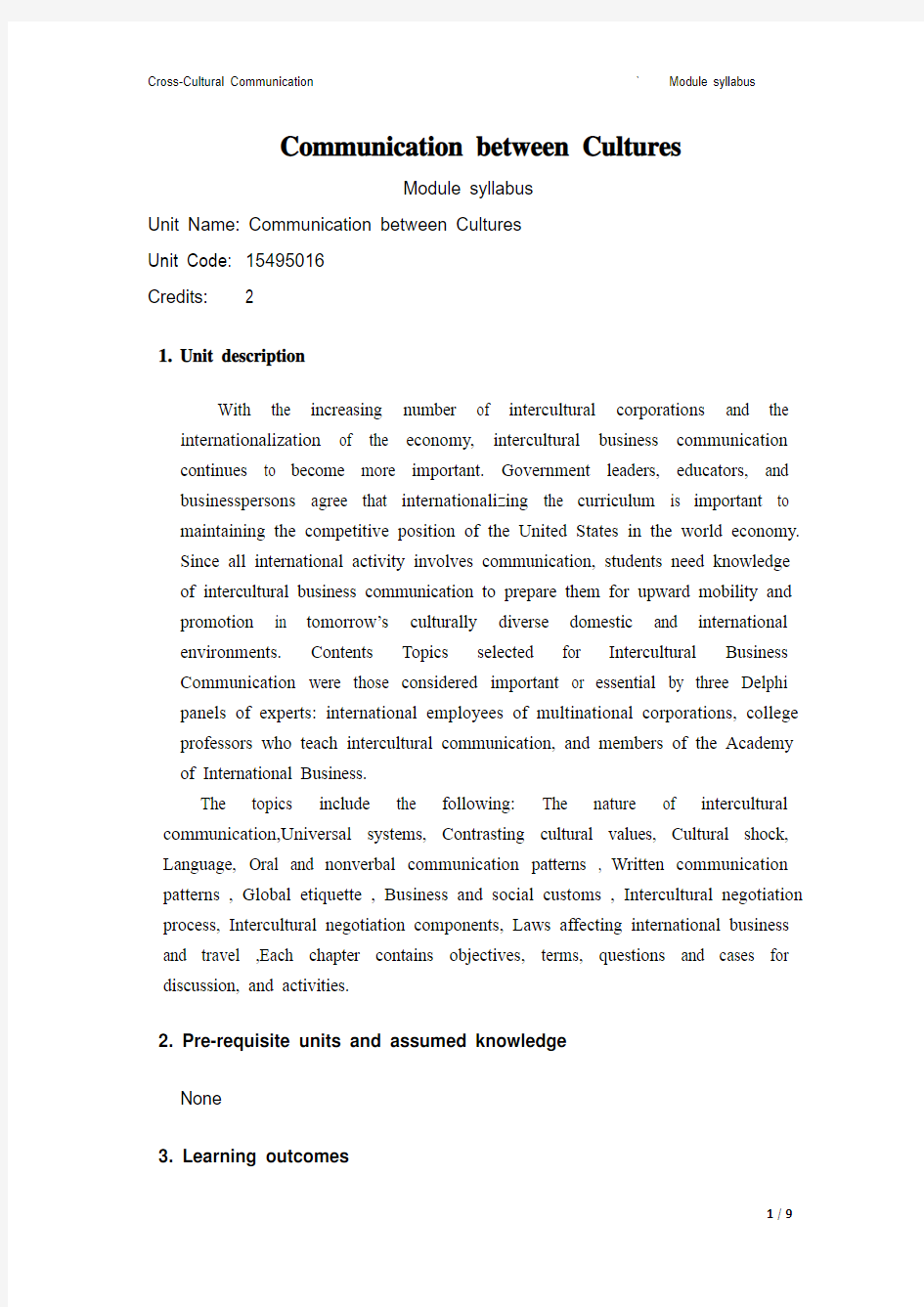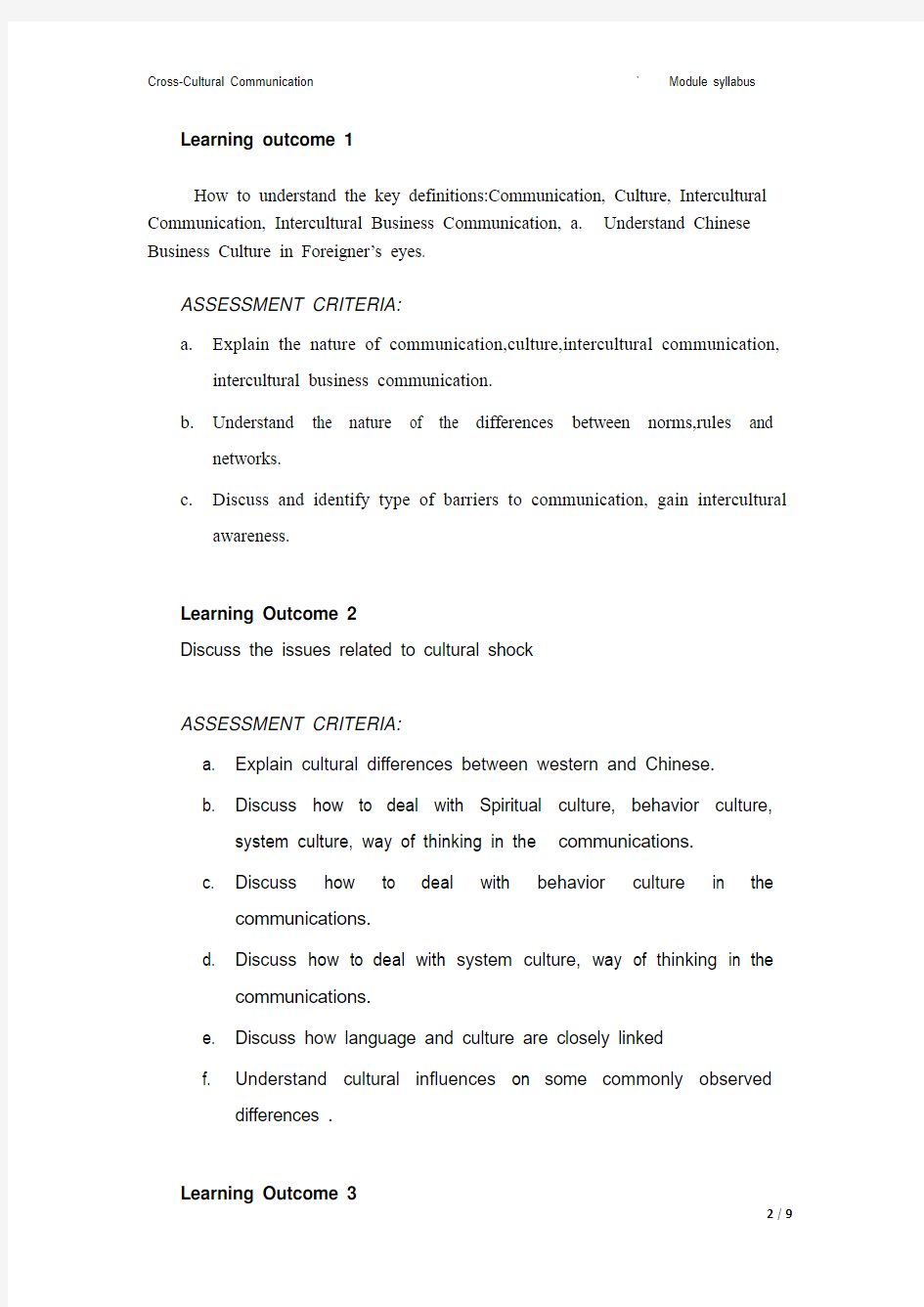communication cross cultrure 甘静


Communication between Cultures
Module syllabus
Unit Name: Communication between Cultures
Unit Code: 15495016
Credits: 2
1.Unit description
With the increasing number of intercultural corporations and the internationalization of the economy, intercultural business communication continues to become more important. Government leaders, educators, and businesspersons agree that internationalizing the curriculum is important to maintaining the competitive position of the United States in the world economy.
Since all international activity involves communication, students need knowledge of intercultural business communication to prepare them for upward mobility and promotion in tomorrow’s culturally diverse domestic and international environments. Contents Topics selected for Intercultural Business Communication were those considered important or essential by three Delphi panels of experts: international employees of multinational corporations, college professors who teach intercultural communication, and members of the Academy of International Business.
The topics include the following: The nature of intercultural communication,Universal systems, Contrasting cultural values, Cultural shock, Language, Oral and nonverbal communication patterns , Written communication patterns , Global etiquette , Business and social customs , Intercultural negotiation process, Intercultural negotiation components, Laws affecting international business and travel ,Each chapter contains objectives, terms, questions and cases for discussion, and activities.
2. Pre-requisite units and assumed knowledge
None
3. Learning outcomes
Learning outcome 1
How to understand the key definitions:Communication, Culture, Intercultural Communication, Intercultural Business Communication, a. Understand Chinese Business Culture in Foreigner’s eyes.
ASSESSMENT CRITERIA:
a.Explain the nature of communication,culture,intercultural communication,
intercultural business communication.
b.Understand the nature of the differences between norms,rules and
networks.
c.Discuss and identify type of barriers to communication, gain intercultural
awareness.
Learning Outcome 2
Discuss the issues related to cultural shock
ASSESSMENT CRITERIA:
a. Explain cultural differences between western and Chinese.
b. Discuss how to deal with Spiritual culture, behavior culture,
system culture, way of thinking in the communications.
c. Discuss how to deal with behavior culture in the
communications.
d. Discuss how to deal with system culture, way of thinking in the
communications.
e. Discuss how language and culture are closely linked
f. Understand cultural influences on some commonly observed
differences .
Learning Outcome 3
Explain global etiquette and how to use in the communications
ASSESSMENT CRITERIA:
a.Understand cultural differences in making introductions ,greetings, and
handshakes as well as customs related to business exchange.
b.Understand how position and status affect cultural interaction
c.Explain the role of etiquette that apply to communicating by telephone and
electronically with persons of other cultures.
d.Explain what forces influence the supply of etiquett
e.
e.Discuss how to give gift vary from culture to culture and the role of gift
giving in establishing favorable intercultural relations.
f.Business and social customs
Learning Outcome 4
Explain the four type religious to effect communications
ASSESSMENT CRITERIA:
a.Describe the influence of religion.
b.Explain doctrine of the Buddhism, Taoism, Islam, Christianity
c.Explain taboo of the Buddhism, Taoism, Islam, Christianity
4. Weighting of final grade
Grades will be assigned on the basis of the following percentages:
5. Policies
Attendance Policy
Attendance in class is mandatory for all students enrolled in the course. Any excused absence must be discussed directly with the teacher. Being late to class within 15 minutes will be recorded as 1 LATE and being late over 15 minutes will be recorded as 1 ABSENCE. 3 LATES equal to 1 ABSENCE. 20% absences of the total teaching hours will cause an F (a failing grade) directly. However, students are still welcome to continue to attend class. F students have no right to drop this course anymore. Each unexcused absence will result in the lowering of the attendance grade by 1 point. Each excused absence will result in the lowering of the attendance grade by 0.5 point.
Participation Policy
Students should participate in their chosen classes actively and effectively. The Participation Grade is related to the Attendance Grade. Students’ final attendance grade is the maximum of their participation grade.
Participation grade will be based on a variety of factors including, but not limited to taking part in class discussions and activities, completing assignments, being able to answer questions correctly, obeying class rules, and being prepared for class, frequent visiting your instructors and chatting in English during their office hours is highly recommended.
Policy on Assignments and Quizzes
Students should finish their assignments completely and punctually. Assignment should be submitted on the date appointed by the instructor. If a student cannot hand in the assignment on time, the reasonable excuse will be needed. Late assignments will receive a maximum grade of 80. An assignment that is late for 3 days will be corrected but receive 0.
You are recommended print all your assignment in the uniform format with t he heading of Student’s Pledge of no cheating. Written as signment or printed ones without the uniform heading of pledge will receive a maximum grade of 80.
It is mandatory to have weekend assignment every week. Any weekend assignment should be submitted on first class of next week. It is mandatory to have holiday assignment on the public holidays. Any holiday assignment should be submitted on the first day on returning to school. Students are required to do a multitude of presentations during the course.
Plagiarism
Any form of cheating is NEVER tolerated. Any student ONCE caught cheating on a quiz, assignment or examination will receive a 0 for that particular work of the whole semester. At the beginning of the semester the definition of plagiarism will be carefully explained. When any thoughts or writings of another person are used, the sources must be clearly identified (using quotes, bibliography and giving reference).
Classroom Policies
●No eating, cellular phones, electronic dictionaries, smoking, chatting or
drowsing in class.
●Please speak in English rather than Chinese in class.
●Students are not allowed to attend class without textbooks.
●Stand up when answering questions.
●Respect classmates’ ideas, opinions, and questions of your classmates.
●You are welcome to visit the instructor’s office in his/her office hours.
●Take good care of the laboratory facilities. Do not splash water on the
desktop.
●When each class is over, hang the earphone on the hanger. Put the trash into
the trash-bin.
●All your classroom involvement, performance and after-class
communications with instructor will affect your participation score.
●All communications with the teacher must be in English, both inside and
outside class time.
6. Texts and other recourses
The primary textbook:
Lillian H. Chaney. Jeanette S.Martin .(2015) “Cross-Cultural Communication”. 6th edition 中国人民大学出版社. China
The supplementary textbook:
Larry A. Samovar, Richard E. Porter, Cross-Cultural Communication”. 7th edition,北京大学出版社,中国
窦卫霖,跨文化商务交流案例分析(第二版)对外经济贸易大学出版社,中国。
王培英,跨文化交流,旅游教育出版社,2007
7. Teaching methods
Lectures, Discussions,Case and Analyses , Homework
8. Session Plan
